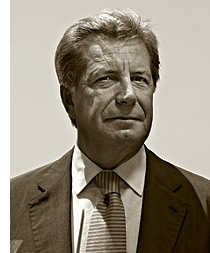by Art Kleiner
The CEO of Europe’s second-largest utility says that energy companies must adapt in a fast-changing global marketplace.
 |
| Photograph by Reed Young |
Chief executives of energy companies face a paradoxical situation in 2008. On the one hand, their product is priced higher than it has been in living memory, and demand is growing fast. On the other hand, fuel is traded as a commodity in global markets, difficult to differentiate, with a raft of alternative fuels on the horizon. And its political and economic importance — as a factor in climate change, national security, and economic quality of life — is greater than ever. The result is an unprecedented set of competitive pressures, reshaping both the “upstream” energy industry — those companies involved in exploration and production of oil and natural gas — and the “downstream” retail businesses that sell electricity, heating fuel, and automobile fuel to customers.
Of the corporate leaders wrestling with these pressures, few are as articulate as Fulvio Conti. Conti is the chief executive of Enel SpA, the preeminent Italian electric and gas power company and the second-largest utility company in Europe, in terms of installed capacity. Enel is at the forefront of a transition affecting all power utilities: From their past as strictly regulated entities (often owned by governments), they are rapidly evolving into global energy enterprises operating in a variety of markets.
Only a few years ago, Enel sought diversification within Italy, buying local water companies and establishing a telephone company called Wind. When Conti became CEO in 2005 (he had been Enel’s chief financial officer), the company shifted direction. Enel divested itself of Wind and other nonenergy businesses, and focused purely on energy, expanding into regions where it could find either customers or supplies of fuel. Enel now operates in 21 countries, including Spain, Portugal, and France; most countries in Latin America; the United States; Greece, Romania, Slovakia, and Bulgaria; and Russia. Enel also expanded from its baseline energy businesses — electric power and natural gas — into a variety of forms of energy production, including geothermal, nuclear, photovoltaic, wind, and coal. And it invested heavily in researching and promoting energy efficiency.
This is what it will take, Conti believes, to operate as an energy provider in the next decade. One must be prepared for global growth, be ready to work with a variety of energy producers and technologies, and be focused on both customer and community needs.
Conti and others at Enel are also developing innovative new approaches to public engagement. In the book Megacommunities: How Leaders of Government, Business and Non-Profits Can Tackle Today’s Global Challenges Together, by Mark Gerencser, Reginald Van Lee, Fernando Napolitano, and Christopher Kelly (Palgrave, 2008), Enel is featured for its efforts to develop a multistakeholder approach, especially in regions where it seeks to site new plants. These efforts began after an episode in 2005, when the company had to walk away from a joint venture with British Gas, a liquid natural gas processing facility in Brindisi, Italy, after protests, press criticism, and local government opposition stalled the project. To Conti, this episode represented a turning point; it showed that the established practices for community relations were no longer suitable and that global corporations needed to find new forms of local presence. The episode also led the company to create the Enel Endowment for Environmental Economics, a new faculty position at Harvard University.
With Megacommunities coauthor Fernando Napolitano — the managing partner of Booz & Company’s Italian office and a member of Enel’s board — strategy+business met with Fulvio Conti at his office in Rome, in May 2008. A few weeks earlier, in a speech made at the 11th International Energy Forum (a biennial gathering of energy ministers and industry executives), Conti had laid out an “energy equation”: four imperatives facing both government and business. His perceptions apply not just to the oil, gas, and electric power industries, but to any company struggling to form a global and local footprint.








0 comments:
Posting Komentar